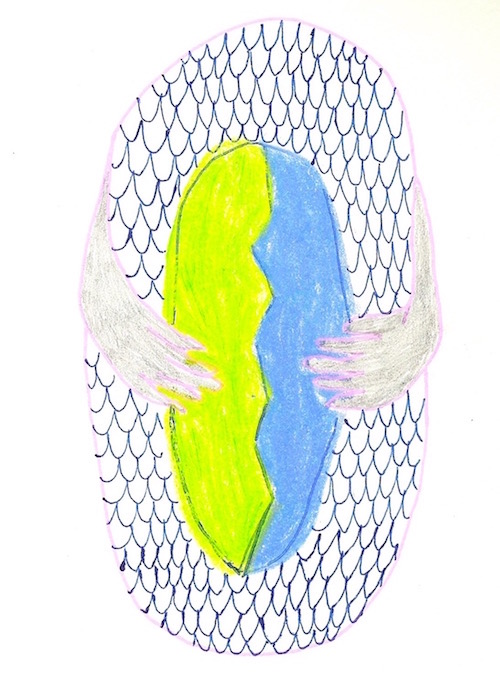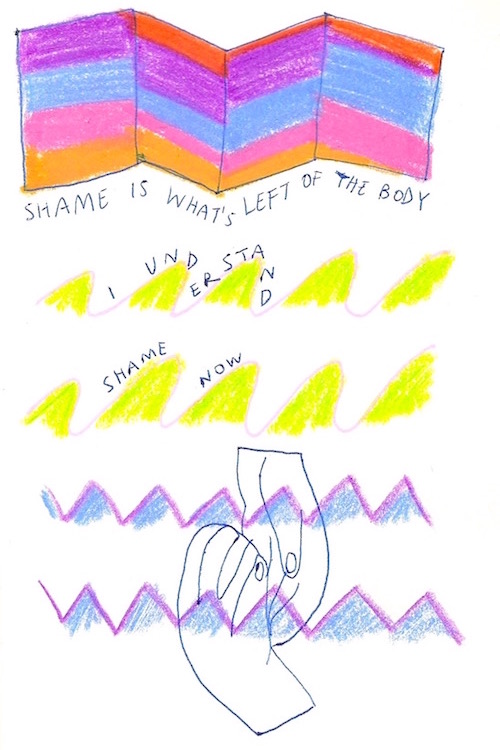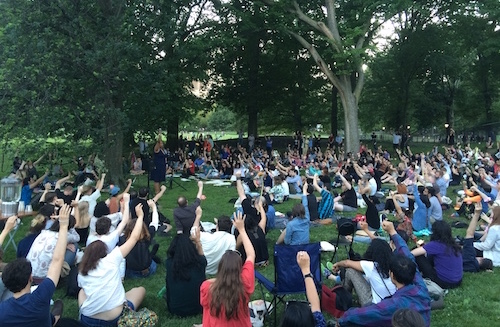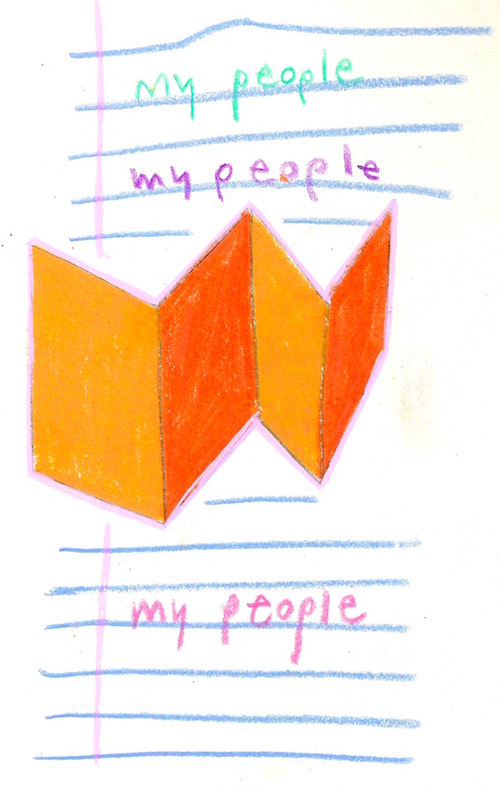
All the way from Myrtle Broadway to Broadway Lafayette to 72nd Street and from Strawberry Fields to Sheep’s Meadow, I hoped I’d run into anyone looking like me who might be headed to Poets 4 Orlando, a reading and gathering held in vigil for the victims of the shooting at Pulse. Two days earlier, Brenda Lee Marquez McCool had been dancing with her son Isaiah Henderson, Stanley Almodovar III had been laughing and singing, food in his mom’s fridge waiting for him, Akyra Monet Murray was visiting her brother, Kimberly Morris was working the door as a bouncer, it was Latin Night at Pulse, reggeton, bachata, merengue, salsa, trans performers Jasmine Lopez and Kenya Michaels on the bill, Latinx queers partying together, flirting, throwing shade, serving looks, celebrating themselves and their community in a safe space founded by Barbara Poma as a memorial for her brother John who died of AIDS, from governmental ignorance, homophobia, racism, and negligence in the face of a plague. I can’t stop crying. It’s been over a week and I can’t stop crying.
Forty-nine queer, overwhelmingly Latinx, mostly Puerto Rican people died. Were murdered. And another 53 were injured. By a shooter influenced by a toxic masculinity promoted by a culture which values aggression and power of force over empathy and thoughtful consideration of one's feelings and the feelings of others. Omar Mateen took his hatred into a Florida gun shop and bought what Deborah A. Miranda called a “hate machine, created to shoot hatred from one person into the soft body of another,” the same kind of hate machine that killed 9 in Charleston, 12 in Aurora, 26 in Sandy Hook, that is still available in shops and at gun shows today, after these mass shootings and hundreds more.

In my heavy black boots, velvet leggings, denim vest, and with a shrinky-dink vulva earring dangling from my ear, I wandered around the vigil still scanning the park-goers for a familiar face to follow to the reading. I found her—bright red Mohawk, black boots, bicycle—walking with a group of people carrying a few boxes and a rolled up banner towards some trees at the edge of the meadow. The low branches and shade of the trees made the space a cool sanctuary. When I think of a sanctuary I think of the mangrove roots and all the little ocean beings growing up in the impenetrable tangle of them. I felt a sense of privacy in public rarely accessible to me and my people, weird queers and people of color walking the streets and hanging out in the parks of New York City. The police presence was less pronounced in the place where we gathered than in Strawberry Fields or at the NYC-Official Vigil for Orlando at Stonewall. I felt safe from the panopticon, or at least I could deflect its gaze for a second and mourn. Xeňa Stanislavovna Semjonová, who organized the reading with the help of Simone Federman, Ana Božičević, Gabe Raines, Se'an, Yetta Kurtland, Dia Felix, NYPD LGBT liaison Sgt. Michelle Martindale and assemblywoman Deborah Glick, told me the 22nd Precinct kept us safe and let us keep our mic on. They kept their distance, and for that respect I am grateful.
At the reading, everyone embraced upon meeting. Asked, “How are you?” earnestly. Said, “I love you.” I hadn’t seen this many hugs in a long time. It was all in line with the love-ins that happened in Sheep’s Meadow in the 60s and 70s—protests against hatred, violence, and war through collective displays of public affection and taking LSD. I lit some copal incense in the crotch of a tree and looked out over the forming semicircle of people. Everyone looked beautiful—unapologetic queers always do. I watched a bee pollinate the flower crown of the person sitting in front of me; they didn’t notice. Some people sat in big groups on colorful blankets, chatting, even laughing a bit, others by themselves, quietly waiting for the reading to start. When it did, Devin Kenny held the mic for Damon Stang as he beat a drum with his bare hands and called upon the spirits. At his instruction I held hands with the femmes next to me. I let my feelings beam out of me and join theirs to encompass the space of the reading, to encompass the meadow, the whole park, the whole city. I found that our feelings are that big, can take up that much space, are that powerful and deserve that much attention.

Whenever I get the hairy half-Latina hard femme working-class lesbo blues, I read the words of the women who came before me and fought most of my fights already and won some, so that hopefully I’ll not have to fight them again: Gloria Anzaldúa, Audre Lorde, Dorothy Allison, Eileen Myles, Virginie Despentes. I listen to Chavela Vargas or Alix Dobkin or 7 Year Bitch, read Sinister Wisdom, Heresies, the Queer City issue of the Portable Lower East Side or a random piece from The New Fuck You, edited by Eileen Myles and Liz Kotz. On my way to Poets 4 Orlando, I grabbed Audre Lorde’s Sister Outsider, the first book I’d ever read written by an out lesbian about queer, poetic, feminist theory. It shook me up as much as it grounded and validated so many things and ideas I’d been feeling. The essay “Uses of the Erotic: The Erotic as Power” let me think of my pleasure as a gift. The essay “Poetry Is Not A Luxury” outlined to me the potential of the poetic process to create change through lasting action enabled only through the true knowledge gleaned from respecting, scrutinizing, exploring, and cherishing our feelings.
Poetry, Lorde writes, “is a vital necessity of our existence. It forms the quality of the light within which we predicate our hopes and dreams toward survival and change, first made into language, then into idea, then into more tangible action.” Springing from a feeling of an experience distilled, illuminated through the time and careful consideration a person gives that feeling that constitutes a poem, poetry reveals what we want or fear or simply feel, gives us the chance to put it into a sharable language while preserving our personal language, the opportunity to wrap our heads around it (an event, a reaction), to listen to it and to have others listen and to listen to what they hear, and then to move forward together, collaboratively, into a dream of the future that will feel right to us. Revolutionary change, a “true alteration of the very foundations of our lives,” as Audre Lorde puts it, is impossible without the examination, respect, and communication of our feelings and of the feelings of those who white-supremacist heteropatriarchial capitalism oppresses, impoverishes, sickens, murders, massacres, and erases: the Latinx queer victims of the shooting at Pulse, the homeless queer youth abused inside of and forced out of their homes and disowned by their families, transpeople of color killed in the streets, harassed and beaten by police.
Change is necessary for the survival of our communities. As Gloria Anzaldúa wrote in her essay, “La Prieta,” “the rational, the patriarchal and the heterosexual have held sway and legal tender for too long.” The established power structure that refuses to acknowledge our humanity, debates our equal rights, deprives us of queer justice and validation cannot keep us safe. Even in its attempt to hold space for the victims of the Pulse shooting at the Vigil for Orlando at Stonewall, they have succeeded only in showcasing their ignorance: posting policemen on top of buildings, armed with big guns too similar to the one that weaponized hatred against the queer and Latinx Pulse victims the vigil was meant to honor. If the Vigil at Stonewall had turned into a riot, would the police be there to protect us? At Poets 4 Orlando Christopher Soto said, “Don’t use our deaths to further cause harm to our communities.” I hope this was heard by the people in power who think they’re doing the right thing when they bring guns to the vigils, but I fear it was not.
Change is necessary too, in the ways in which we as a culture access the discourse around tragedy and are then able to use that discourse to prevent future massacres. From the beginning, the media’s focus on the shooter’s possible ties to various Middle Eastern terrorist organizations erased the wider context of homophobia, racism, and violence toward queer and Latinx communities which, coupled with a capital-driven promotion of gun culture in the U.S., endangered the Pulse victims in the first place. Pointing the finger outward in this way evades accountability and promotes Islamophobia. Poet Shireen Ahmed wrote that the widespread mispronunciation of “Muslim” itself indicates the imbalance of voices we hear from in the news. We can no longer allow media conglomerates to decide which voices reach us and which stories are left out all together.
For our new news source and toward a queer, feminist, anti-capitalist future: poetry and the physical space of the reading. “When nothing makes sense,” Ana Božičević told me, “poetry does, it does deliver the news.” The news of Eddie Justice texting his mother Mina from the bathroom at Pulse the words “I’m gonna die,” read at Poets 4 Orlando by Myles Golden, who later said to me,“I use my fear to speak, I use my fear to listen, and I use my fear to act.” The safety and sacred space of the club, described by Dulcina Abreu when she says, “we stop the world at the door.” The validation I felt when Stephen Boyer said, “people don’t always think it’s real, but it is.” The pain in Orlando Tirado’s voice, singing “adios muchachos adios, para siempre adios,” while members of the queer ballet company Ballez performed in the background, moving together like angels, like a flock of birds, then falling to the ground all together, some of them not getting back up, being comforted by others, carried aside, held, danced with. Gloria Anzaldúa described another world, El Mundo Zuro, in which she said “I with my own affinities and my people with theirs can live together and transform the planet.” Poets 4 Orlando was one Mundo Zuro of my own.

At Poets 4 Orlando I met Anna Vila, whose drawings made during the reading are included here. When I asked her why she came, she said she was sad and wanted to be around other people. Me too, I said. She gave me two glow sticks and I wove them between the laces of my boot; we took a picture of it and giggled. It was good, in the face of this sick hate and violence against my family, to remember that being queer is not a tragedy. People stayed late, from blue dark to dark dark, poets reading by flashlight, and I eavesdropped on their quiet conversations. Do you wanna go to Matthew’s on 92nd? I’m hungry, let’s get something to eat. Are you going to Henrietta Hudson?

Thank you to the readers and performers at Poets 4 Orlando: Dulcina Abreu, Shireen Alia Ahmed, Andrea Arrubla, Ballez, Amelia Bande, Ana Božičević, Chase Berggrun, Katy Bohinc, Stephen Boyer, Geoffrey Bridgman, Cecilia Corrigan, Dandy Darkly, Joey De Jesus, Amanda Duarte, Myles Golden, Nicole Goodwin, Simone Federman, Dia Felix, Sylvia Gutierrez, Joseph Keckler, Devin Kenny, Paul Legault, Lindsey Leonard, Yanyi Luo, Dawn Lundy Martin, Jillian Mcmanemin, Slava Mogutin, Roberto Montes, Caitie Moore, Hannah Sampson, Xeňa Stanislavovna Semjonová, Suneela Sunbula, Gabe Raines, Christopher Soto, Christine Stoddard, Damon Stang, Anthony Thornton, Orlando Tirado, and Chavisa Woods.
Thank you to Xeňa Stanislavovna Semjonová for organizing this response, to Simone Federman for helping produce and Ana Božičević for helping organize the event. Gabe Raines and Se'an for technical help. Yetta Kurtland for her timely assistance with legal counsel. The NYPD LGBT laison Sgt. Michelle Martindale and assemblywoman Deborah Glick for negotiating with Central Park, and the 22nd Precinct for keeping us safe and for keeping the mic on.
All drawings are by Anna Vila, courtesy of the artist.
Francesca DeMusz is a poet and writer whose work has appeared in The Poetry Project Newsletter, All ...
Read Full Biography

